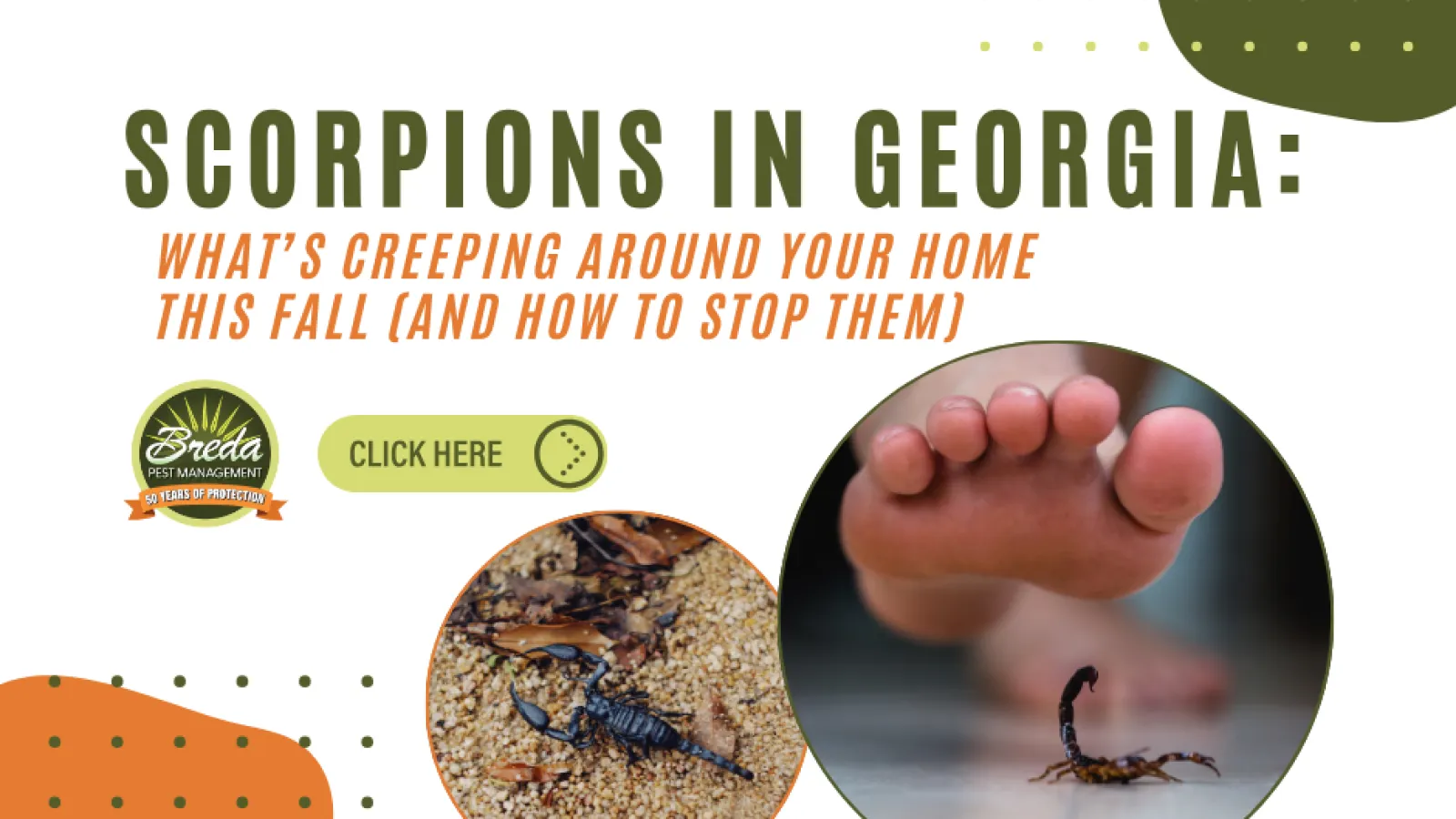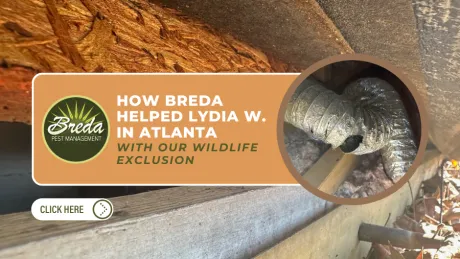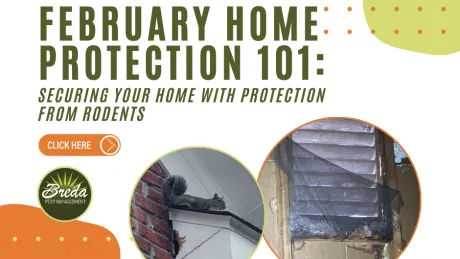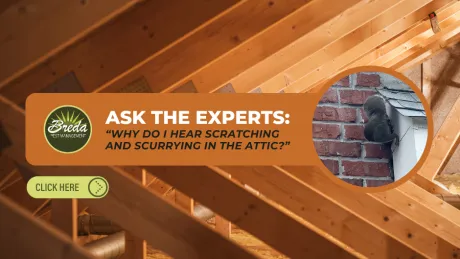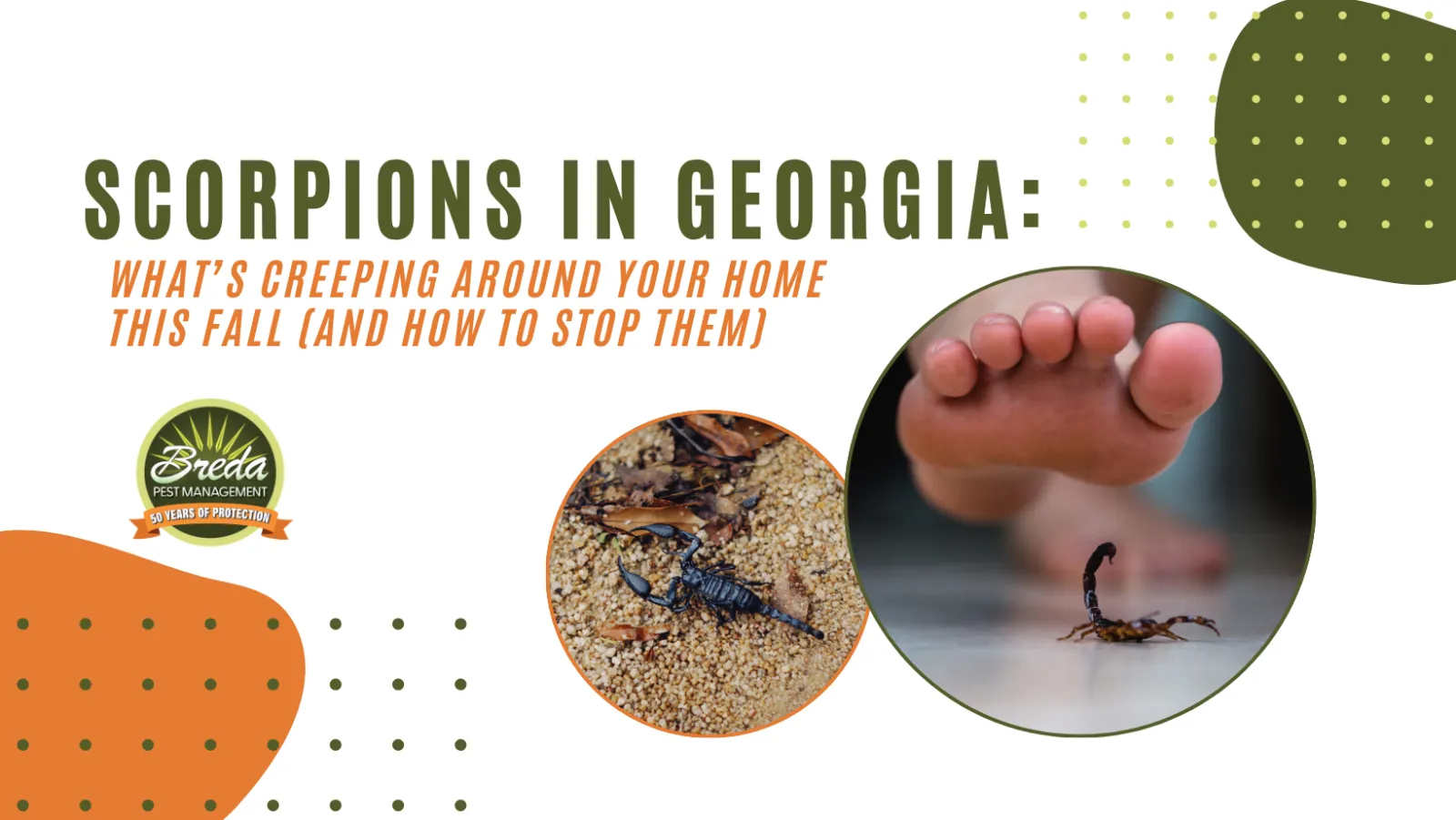
When you think of scorpions, you probably picture deserts in Arizona—not your backyard in Metro Atlanta. But here's the truth: Georgia has scorpions, and they're more common than most homeowners realize.
While these critters aren't the deadly kind you see in movies, they can still deliver a sting that'll make you jump—and they tend to show up just when you're least expecting them. As temperatures drop and the fall rains arrive, scorpion activity in Atlanta homes begins to spike.
So, before you step into your garage or pick up that leaf pile outside, let's talk about which scorpions you might encounter, why they show up in the fall, and how BREDA Pest Management keeps them from becoming unwanted houseguests.
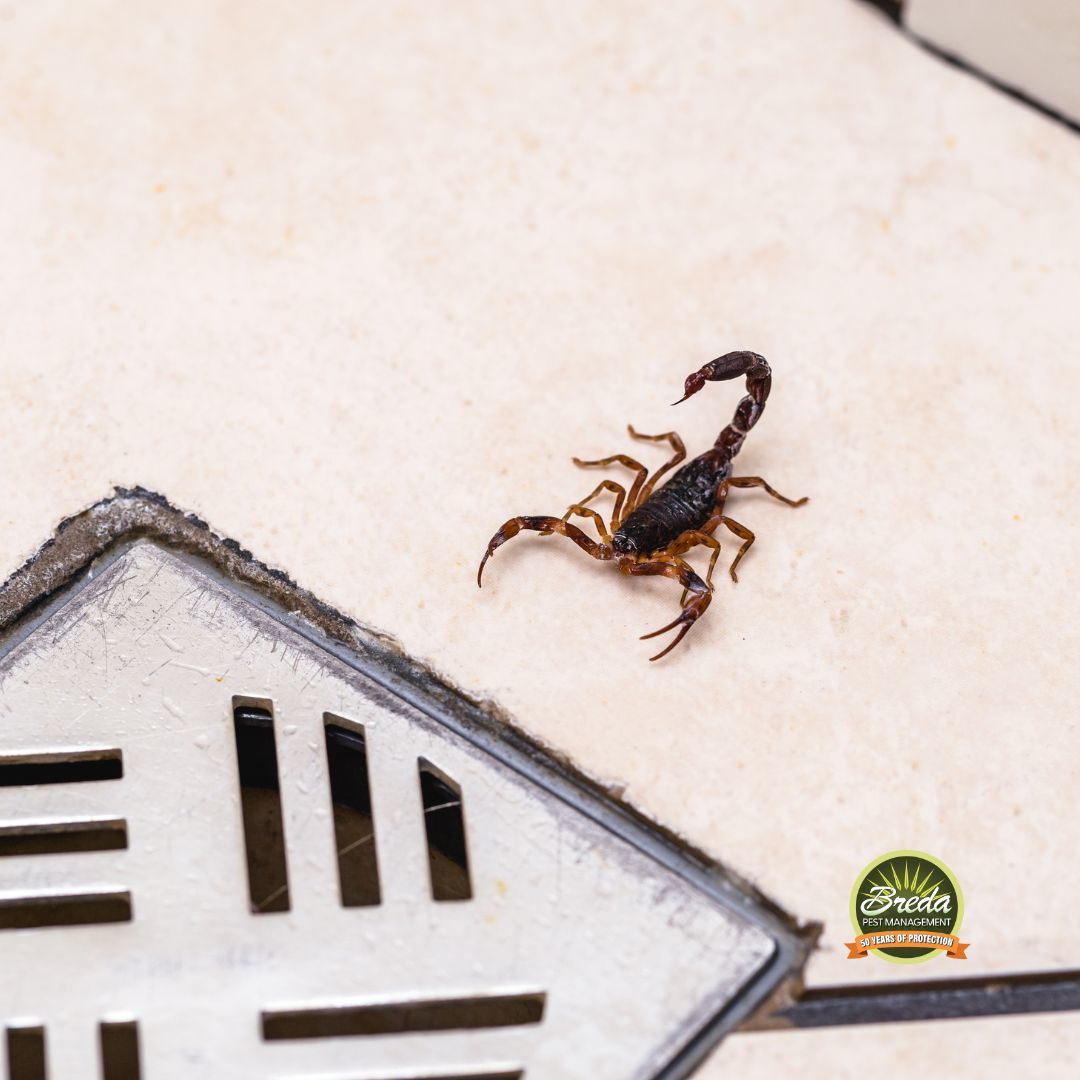
Meet Georgia's Native Scorpions
Yes, Georgia really does have its own scorpion species—two of them, in fact.
The Southern Devil Scorpion
Also known by its scientific name Vaejovis carolinianus, this species is the most common scorpion you'll find in the Southeast. It's native to Georgia, Alabama, and the Carolinas, and often lives under rocks, bark, or piles of debris.
In fall, Southern Devil Scorpions around Atlanta homes become more visible as they seek shelter from cooler nights. Their stings are painful—comparable to a wasp or hornet—but rarely dangerous unless you have severe sting or venom allergies.
The Striped Bark Scorpion
Slightly less common but still present in the region, the Striped Bark Scorpion (Centruroides vittatus) is a bit smaller and tends to favor dry, sheltered spots like under leaf litter, logs, or crawl spaces. They're nocturnal, shy, and usually only sting if handled or trapped.
If you've noticed one of these critters in your yard or, worse, inside your house, you're not alone—fall scorpion infestations in Atlanta homes are a growing concern each year.
Why You're Seeing Scorpions in Fall
Scorpions are cold-blooded arachnids, which means they depend on environmental warmth to survive. When temperatures dip in late September and October, they start looking for a cozy place to ride out the season.
Here's why fall brings them closer to (or inside) your home:
Changing Temperatures: When cool air replaces summer heat, scorpions seek warmth indoors—especially in basements, garages, and crawl spaces.
Moisture Matters: These pests love damp environments. Fall rain creates the perfect conditions for scorpions to thrive under leaves, mulch, and downspout trays.
Food Supply: Scorpions feed on insects. If your property already has ants, spiders, or crickets, scorpions will follow.
This is why Atlanta pest control for scorpions often spikes in early fall. Homeowners start finding these pests near thresholds, under leaf piles, and sometimes even in bathrooms or laundry rooms—anywhere with moisture and easy access.
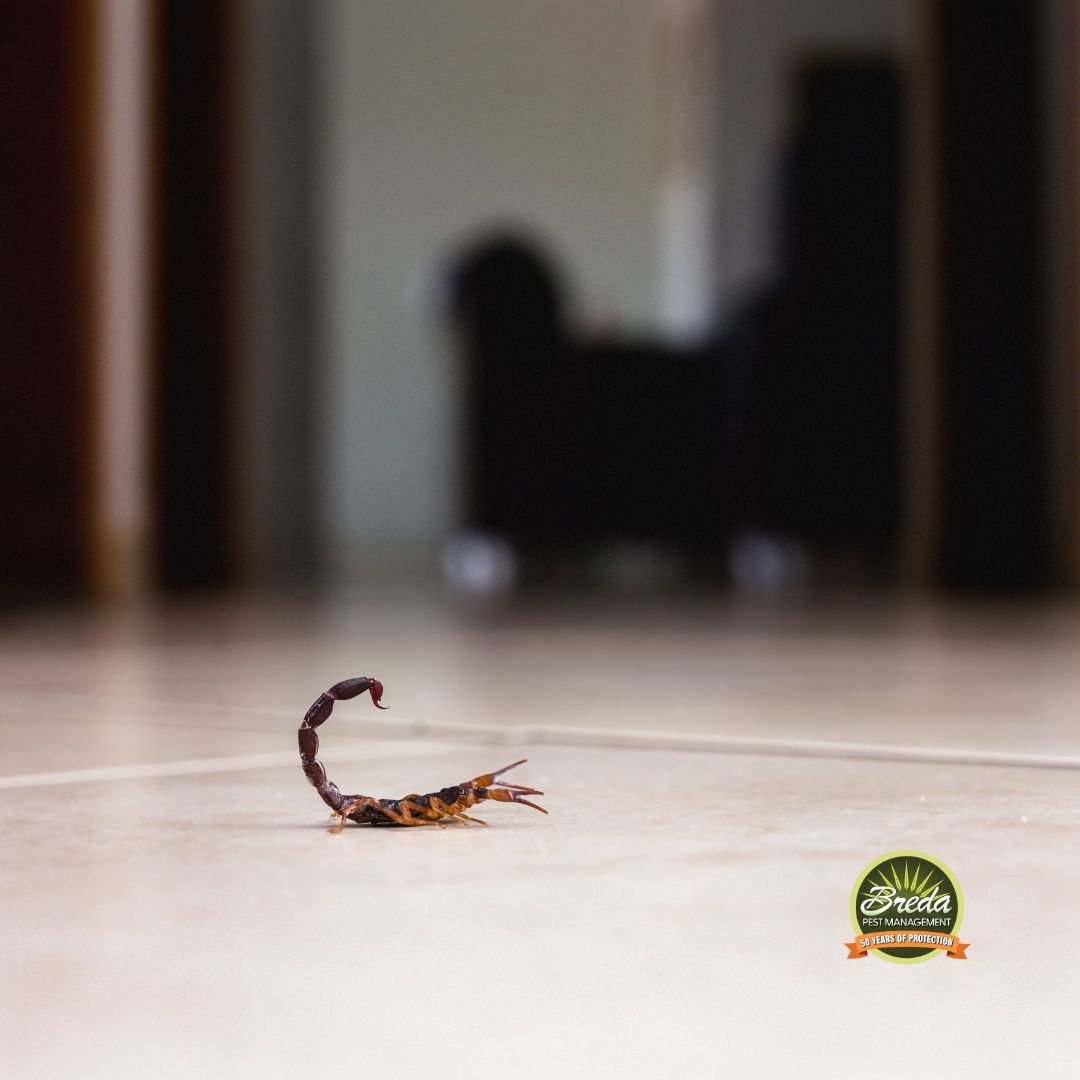
How Scorpions Sneak Indoors
Scorpions are surprisingly good at squeezing into small spaces. Here are a few of their favorite ways to get inside:
Under Door Thresholds: Gaps at the base of doors are like a welcome mat. Sealing thresholds tightly is one of the most effective scorpion prevention services in Atlanta GA.
Cracks in Foundation or Brickwork: Even small fissures can serve as entry points.
Vents and Downspouts: Fall leaf build-up in these areas attracts insects, which attract scorpions.
Gaps Around Windows or Utility Lines: The perfect access points for pests seeking warmth.
If you're spotting scorpions repeatedly, it's time to bring in a professional scorpion control expert in Atlanta GA.
Are Georgia Scorpions Dangerous?
For most people, scorpion stings are painful but not life-threatening. They're similar to a wasp sting—sharp, burning, and sore for a few hours. However, people who are allergic to insect stings (and carry an epipen) may experience stronger reactions.
That said, the real issue isn't danger—it's discomfort and the unsettling thought of a scorpion crawling across your floor.
That's where BREDA Pest Management comes in.
How BREDA Keeps Scorpions Out for Good
BREDA doesn't just spray and go. Their pest control services are designed to solve the root of the problem: why pests, including scorpions, are showing up in the first place.
Here's how BREDA's scorpion removal services in Atlanta GA protect your home:
1. Comprehensive Inspections
BREDA technicians start by identifying problem areas—moisture zones, debris build-up, and access points. This full inspection approach ensures no hiding spots are missed.
2. Targeted Insect Reduction
Since scorpions feed on other insects, reducing the general pest population is the first line of defense. By eliminating ants, crickets, and spiders, BREDA cuts off their food supply.
3. Exclusion and Sealing
Using specialized materials and tools, BREDA seals cracks, door gaps, and vent openings—blocking scorpions from getting inside.
4. Treatment Where It Counts
For outdoor control, BREDA applies targeted treatments in high-risk areas like mulch beds, leaf piles, and around downspouts.
5. Long-Term Prevention
With professional scorpion control in Atlanta GA, BREDA provides customized recommendations for keeping your home pest-free through every season.
This integrated approach makes BREDA one of the best scorpion extermination companies in Atlanta Georgia—combining prevention, elimination, and ongoing protection.
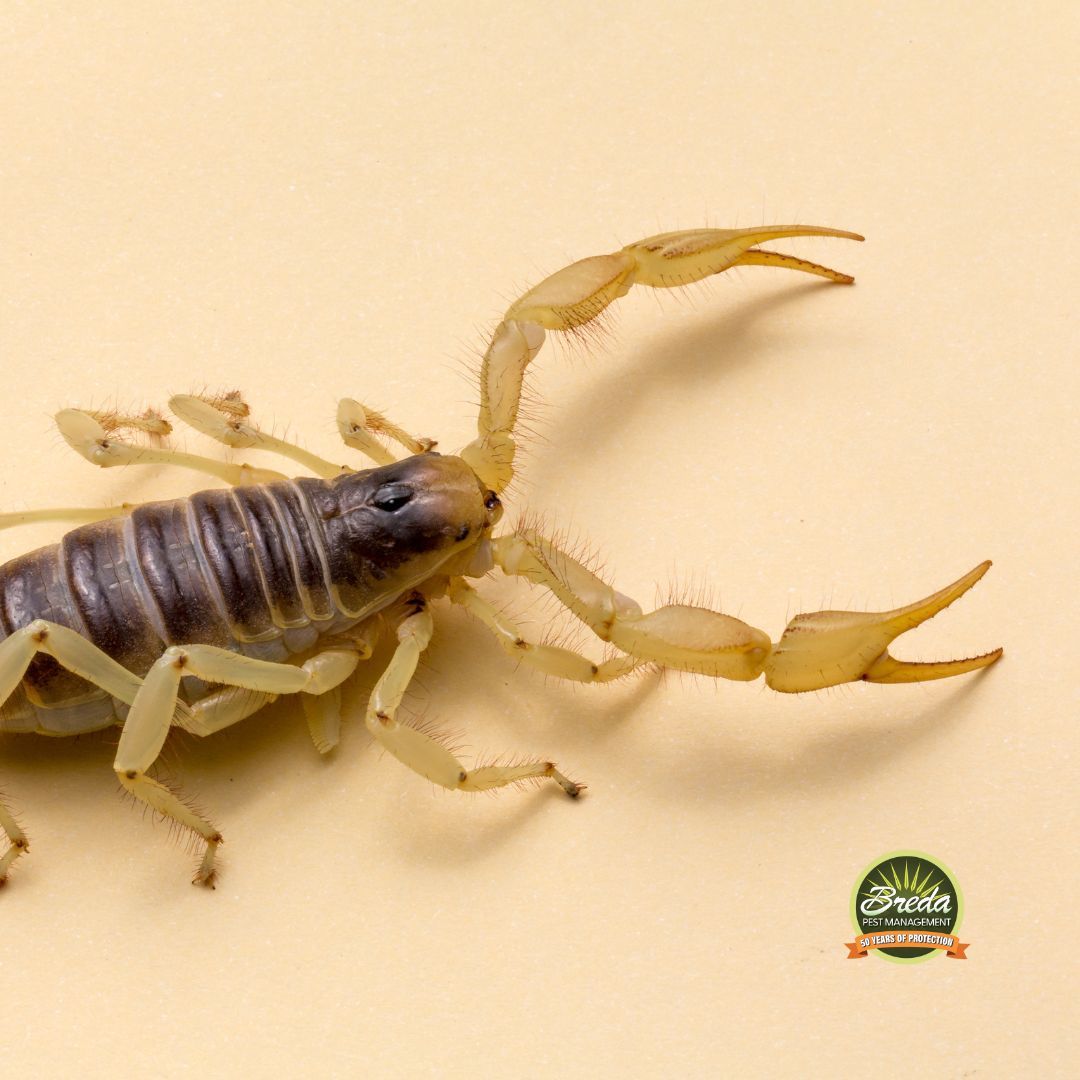
What Homeowners Can Do
You can help reduce your scorpion risk with a few simple steps between treatments:
Rake leaves away from the foundation. Scorpions love leaf piles for their warmth and moisture.
Check downspouts and drain trays. Keep them clear of debris where scorpions like to hide.
Seal cracks and replace worn weatherstripping. This strengthens your home's barrier.
Reduce moisture. Fix leaks and use dehumidifiers in basements or crawl spaces.
Keep outdoor lighting minimal. Light attracts insects, which attract scorpions.
But remember—these steps can only go so far. Once scorpions have found a way inside, DIY fixes won't be enough.
Why Scorpion Problems Mean You Might Have Other Pests
Scorpions don't just appear out of nowhere—they follow the food. If you're finding scorpions in or around your home, there's a good chance you also have an underlying insect issue.
That's why BREDA's full-service Atlanta pest control covers everything from insects to rodents to wildlife. When you control one, you naturally reduce the others.
And since scorpions are part of the ecosystem that feeds on bugs, eliminating their food source is the smartest prevention strategy.
The BREDA Difference
Not all pest control companies are created equal. BREDA's local, family-owned team brings over 50 years of experience handling Georgia's unique pest challenges.
With industry-leading technology, a guaranteed approach, and a focus on long-term results—not just short-term fixes—BREDA stands out as the leader in professional scorpion control in Atlanta GA and beyond.
When homeowners call BREDA, they're getting more than scorpion removal services in Atlanta GA—they're getting peace of mind that every pest problem, big or small, is handled the right way.
Don't Let Scorpions Crash Your Fall Season
As the seasons shift and nights get cooler, scorpions will be looking for somewhere warm to hide. Don't let that place be your home.
With BREDA's scorpion prevention services in Atlanta GA, you'll have the confidence that your home is fully protected—from entry points to moisture zones to food sources.
Contact BREDA Pest Management today to schedule an inspection and keep scorpions (and their favorite snacks) out for good.
If you'd like to learn more about the native scorpion species found in Georgia, the University of Georgia Extension's guide on scorpions is an excellent educational resource for homeowners.
If you're tired of wondering what the pests in or around your home are doing and just want them gone, don't hesitate to give us a call. The BREDA Guarantee promises to protect your home and keep it protected—no matter the circumstances. Schedule an inspection online or give us a call at 770-466-6700.
